Globalization: Analyzing Economic, Social, and Political Impacts
VerifiedAdded on 2022/10/18
|8
|2597
|451
Essay
AI Summary
This essay provides a comprehensive analysis of globalization, examining its multifaceted impacts on economies, societies, and political systems worldwide. It explores the integration of economies, cultures, and communities through the exchange of data, ideas, and trade, facilitated by advancements in transportation and technology. The essay discusses both the positive effects, such as improved living standards in developing nations through enhanced infrastructure, healthcare, and education, and the negative consequences, including uneven economic growth, job insecurity, and cultural shifts. It highlights the importance of government policies in managing globalization's effects and emphasizes the need for a balanced approach to maximize benefits while mitigating adverse impacts, such as terrorism, monetary fluctuations, and social inequalities. The essay also references various studies and reports to support its arguments, concluding that while globalization offers significant advantages, its benefits are not universally distributed, and careful consideration of its ethical and social implications is essential for fostering a more equitable and peaceful global society.
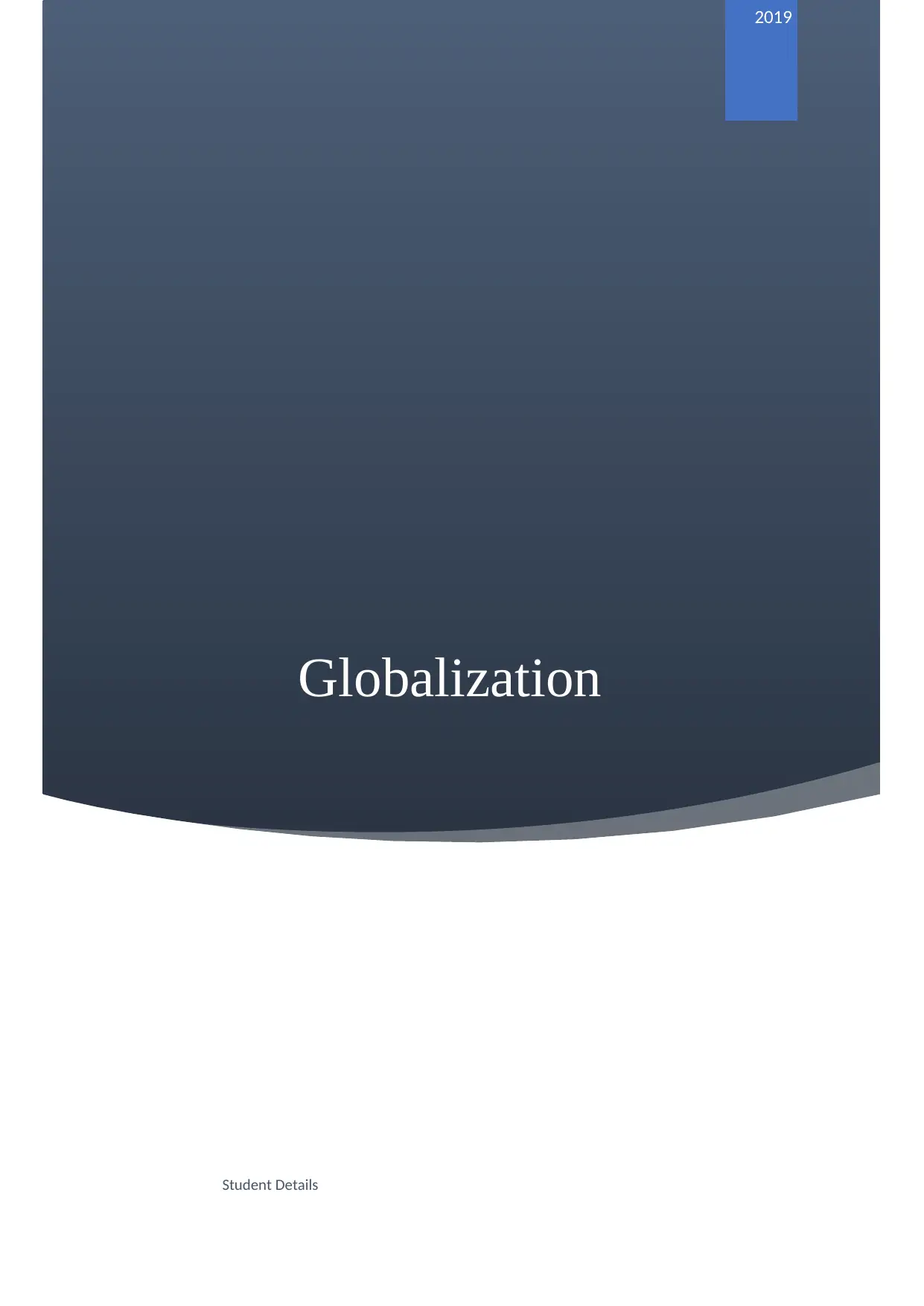
Globalization
2019
Student Details
2019
Student Details
Paraphrase This Document
Need a fresh take? Get an instant paraphrase of this document with our AI Paraphraser
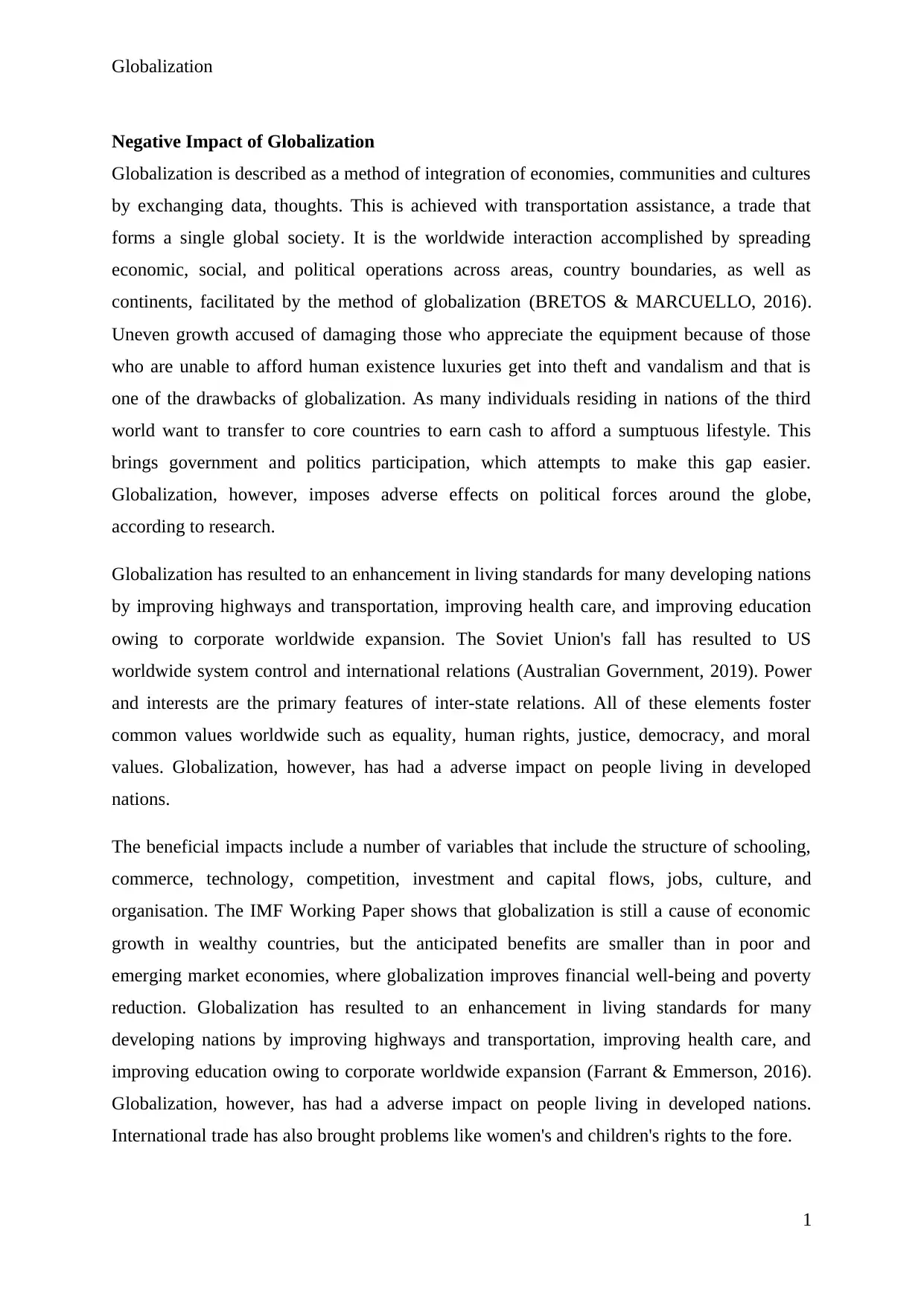
Globalization
Negative Impact of Globalization
Globalization is described as a method of integration of economies, communities and cultures
by exchanging data, thoughts. This is achieved with transportation assistance, a trade that
forms a single global society. It is the worldwide interaction accomplished by spreading
economic, social, and political operations across areas, country boundaries, as well as
continents, facilitated by the method of globalization (BRETOS & MARCUELLO, 2016).
Uneven growth accused of damaging those who appreciate the equipment because of those
who are unable to afford human existence luxuries get into theft and vandalism and that is
one of the drawbacks of globalization. As many individuals residing in nations of the third
world want to transfer to core countries to earn cash to afford a sumptuous lifestyle. This
brings government and politics participation, which attempts to make this gap easier.
Globalization, however, imposes adverse effects on political forces around the globe,
according to research.
Globalization has resulted to an enhancement in living standards for many developing nations
by improving highways and transportation, improving health care, and improving education
owing to corporate worldwide expansion. The Soviet Union's fall has resulted to US
worldwide system control and international relations (Australian Government, 2019). Power
and interests are the primary features of inter-state relations. All of these elements foster
common values worldwide such as equality, human rights, justice, democracy, and moral
values. Globalization, however, has had a adverse impact on people living in developed
nations.
The beneficial impacts include a number of variables that include the structure of schooling,
commerce, technology, competition, investment and capital flows, jobs, culture, and
organisation. The IMF Working Paper shows that globalization is still a cause of economic
growth in wealthy countries, but the anticipated benefits are smaller than in poor and
emerging market economies, where globalization improves financial well-being and poverty
reduction. Globalization has resulted to an enhancement in living standards for many
developing nations by improving highways and transportation, improving health care, and
improving education owing to corporate worldwide expansion (Farrant & Emmerson, 2016).
Globalization, however, has had a adverse impact on people living in developed nations.
International trade has also brought problems like women's and children's rights to the fore.
1
Negative Impact of Globalization
Globalization is described as a method of integration of economies, communities and cultures
by exchanging data, thoughts. This is achieved with transportation assistance, a trade that
forms a single global society. It is the worldwide interaction accomplished by spreading
economic, social, and political operations across areas, country boundaries, as well as
continents, facilitated by the method of globalization (BRETOS & MARCUELLO, 2016).
Uneven growth accused of damaging those who appreciate the equipment because of those
who are unable to afford human existence luxuries get into theft and vandalism and that is
one of the drawbacks of globalization. As many individuals residing in nations of the third
world want to transfer to core countries to earn cash to afford a sumptuous lifestyle. This
brings government and politics participation, which attempts to make this gap easier.
Globalization, however, imposes adverse effects on political forces around the globe,
according to research.
Globalization has resulted to an enhancement in living standards for many developing nations
by improving highways and transportation, improving health care, and improving education
owing to corporate worldwide expansion. The Soviet Union's fall has resulted to US
worldwide system control and international relations (Australian Government, 2019). Power
and interests are the primary features of inter-state relations. All of these elements foster
common values worldwide such as equality, human rights, justice, democracy, and moral
values. Globalization, however, has had a adverse impact on people living in developed
nations.
The beneficial impacts include a number of variables that include the structure of schooling,
commerce, technology, competition, investment and capital flows, jobs, culture, and
organisation. The IMF Working Paper shows that globalization is still a cause of economic
growth in wealthy countries, but the anticipated benefits are smaller than in poor and
emerging market economies, where globalization improves financial well-being and poverty
reduction. Globalization has resulted to an enhancement in living standards for many
developing nations by improving highways and transportation, improving health care, and
improving education owing to corporate worldwide expansion (Farrant & Emmerson, 2016).
Globalization, however, has had a adverse impact on people living in developed nations.
International trade has also brought problems like women's and children's rights to the fore.
1
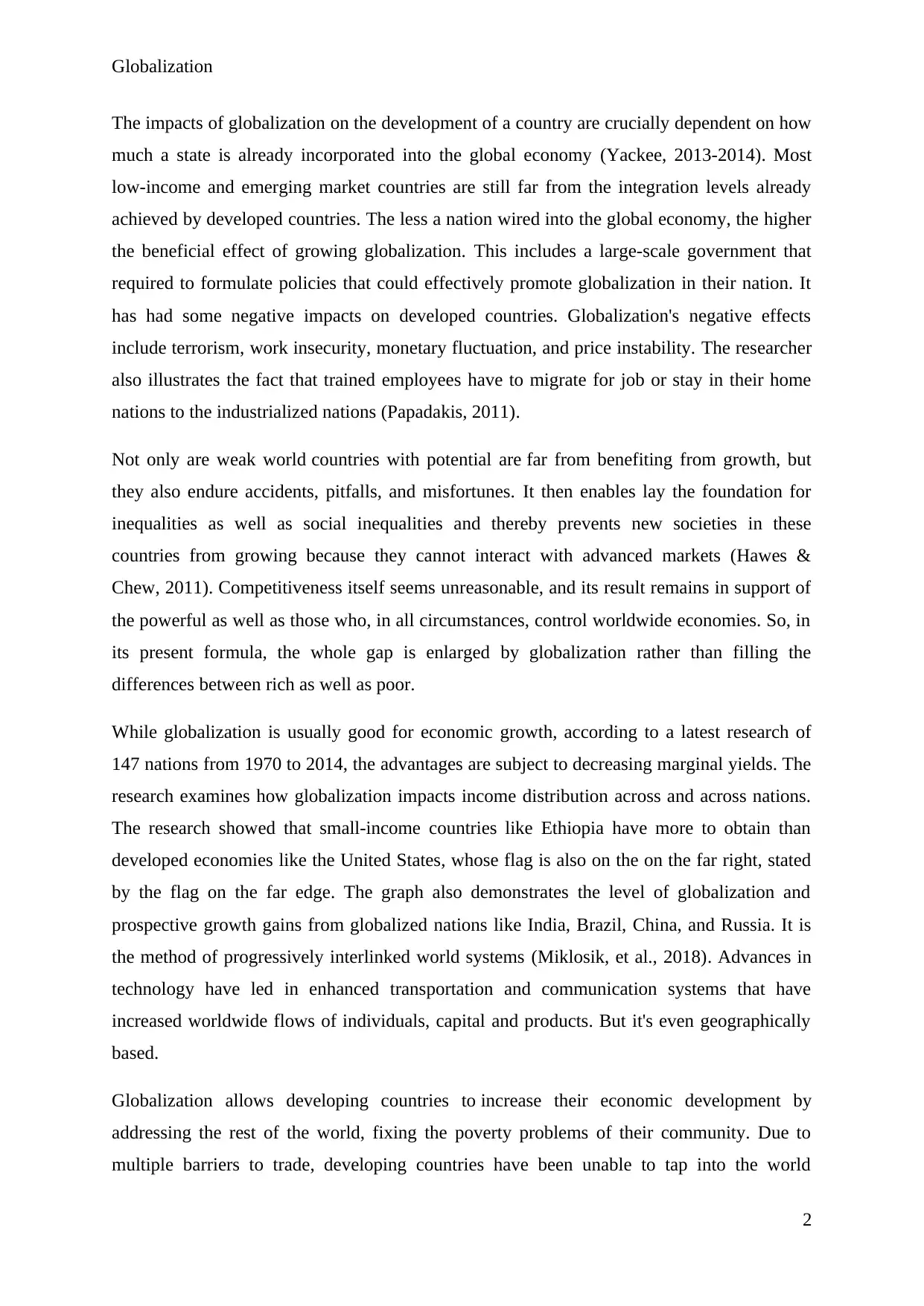
Globalization
The impacts of globalization on the development of a country are crucially dependent on how
much a state is already incorporated into the global economy (Yackee, 2013-2014). Most
low-income and emerging market countries are still far from the integration levels already
achieved by developed countries. The less a nation wired into the global economy, the higher
the beneficial effect of growing globalization. This includes a large-scale government that
required to formulate policies that could effectively promote globalization in their nation. It
has had some negative impacts on developed countries. Globalization's negative effects
include terrorism, work insecurity, monetary fluctuation, and price instability. The researcher
also illustrates the fact that trained employees have to migrate for job or stay in their home
nations to the industrialized nations (Papadakis, 2011).
Not only are weak world countries with potential are far from benefiting from growth, but
they also endure accidents, pitfalls, and misfortunes. It then enables lay the foundation for
inequalities as well as social inequalities and thereby prevents new societies in these
countries from growing because they cannot interact with advanced markets (Hawes &
Chew, 2011). Competitiveness itself seems unreasonable, and its result remains in support of
the powerful as well as those who, in all circumstances, control worldwide economies. So, in
its present formula, the whole gap is enlarged by globalization rather than filling the
differences between rich as well as poor.
While globalization is usually good for economic growth, according to a latest research of
147 nations from 1970 to 2014, the advantages are subject to decreasing marginal yields. The
research examines how globalization impacts income distribution across and across nations.
The research showed that small-income countries like Ethiopia have more to obtain than
developed economies like the United States, whose flag is also on the on the far right, stated
by the flag on the far edge. The graph also demonstrates the level of globalization and
prospective growth gains from globalized nations like India, Brazil, China, and Russia. It is
the method of progressively interlinked world systems (Miklosik, et al., 2018). Advances in
technology have led in enhanced transportation and communication systems that have
increased worldwide flows of individuals, capital and products. But it's even geographically
based.
Globalization allows developing countries to increase their economic development by
addressing the rest of the world, fixing the poverty problems of their community. Due to
multiple barriers to trade, developing countries have been unable to tap into the world
2
The impacts of globalization on the development of a country are crucially dependent on how
much a state is already incorporated into the global economy (Yackee, 2013-2014). Most
low-income and emerging market countries are still far from the integration levels already
achieved by developed countries. The less a nation wired into the global economy, the higher
the beneficial effect of growing globalization. This includes a large-scale government that
required to formulate policies that could effectively promote globalization in their nation. It
has had some negative impacts on developed countries. Globalization's negative effects
include terrorism, work insecurity, monetary fluctuation, and price instability. The researcher
also illustrates the fact that trained employees have to migrate for job or stay in their home
nations to the industrialized nations (Papadakis, 2011).
Not only are weak world countries with potential are far from benefiting from growth, but
they also endure accidents, pitfalls, and misfortunes. It then enables lay the foundation for
inequalities as well as social inequalities and thereby prevents new societies in these
countries from growing because they cannot interact with advanced markets (Hawes &
Chew, 2011). Competitiveness itself seems unreasonable, and its result remains in support of
the powerful as well as those who, in all circumstances, control worldwide economies. So, in
its present formula, the whole gap is enlarged by globalization rather than filling the
differences between rich as well as poor.
While globalization is usually good for economic growth, according to a latest research of
147 nations from 1970 to 2014, the advantages are subject to decreasing marginal yields. The
research examines how globalization impacts income distribution across and across nations.
The research showed that small-income countries like Ethiopia have more to obtain than
developed economies like the United States, whose flag is also on the on the far right, stated
by the flag on the far edge. The graph also demonstrates the level of globalization and
prospective growth gains from globalized nations like India, Brazil, China, and Russia. It is
the method of progressively interlinked world systems (Miklosik, et al., 2018). Advances in
technology have led in enhanced transportation and communication systems that have
increased worldwide flows of individuals, capital and products. But it's even geographically
based.
Globalization allows developing countries to increase their economic development by
addressing the rest of the world, fixing the poverty problems of their community. Due to
multiple barriers to trade, developing countries have been unable to tap into the world
2
⊘ This is a preview!⊘
Do you want full access?
Subscribe today to unlock all pages.

Trusted by 1+ million students worldwide
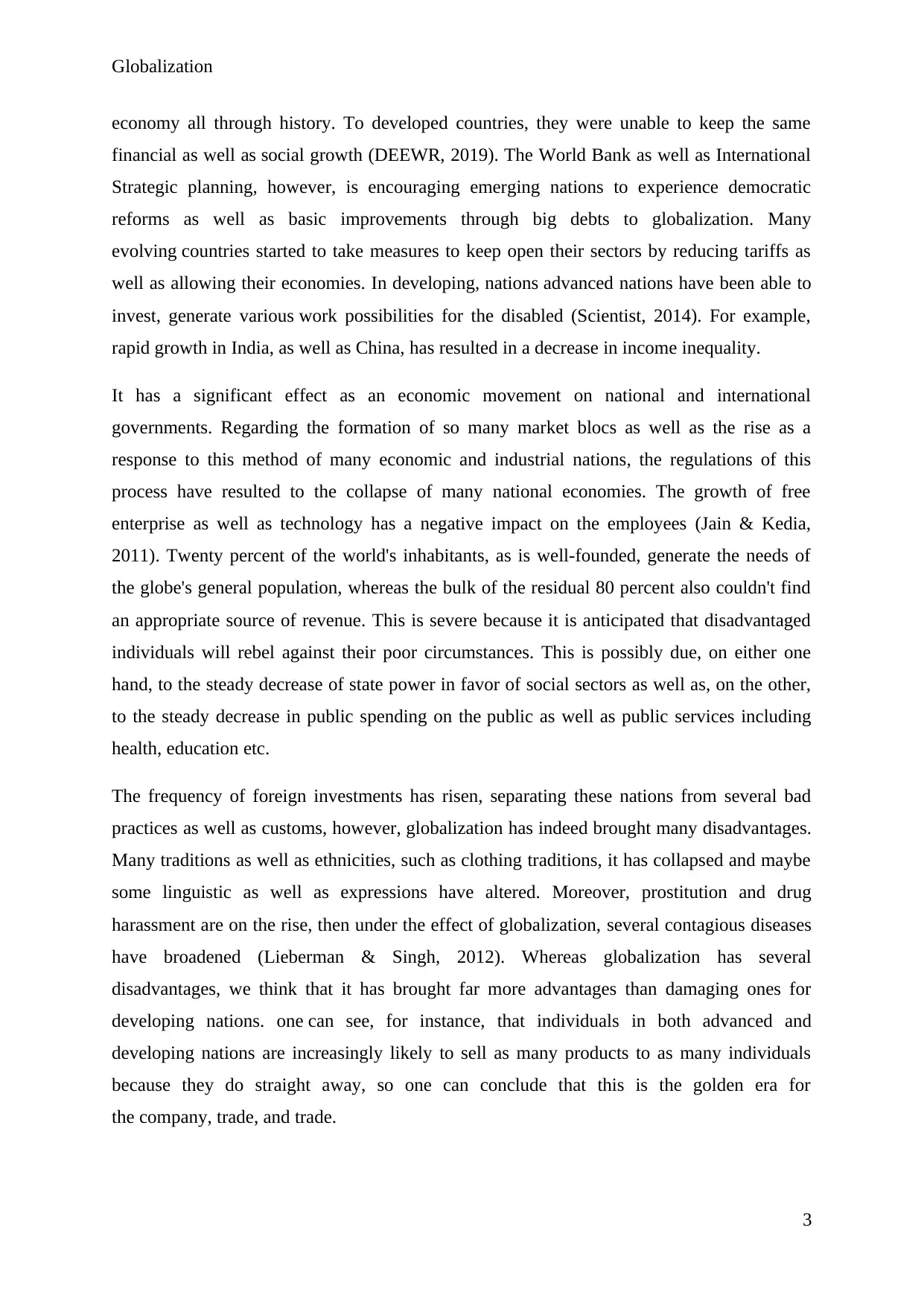
Globalization
economy all through history. To developed countries, they were unable to keep the same
financial as well as social growth (DEEWR, 2019). The World Bank as well as International
Strategic planning, however, is encouraging emerging nations to experience democratic
reforms as well as basic improvements through big debts to globalization. Many
evolving countries started to take measures to keep open their sectors by reducing tariffs as
well as allowing their economies. In developing, nations advanced nations have been able to
invest, generate various work possibilities for the disabled (Scientist, 2014). For example,
rapid growth in India, as well as China, has resulted in a decrease in income inequality.
It has a significant effect as an economic movement on national and international
governments. Regarding the formation of so many market blocs as well as the rise as a
response to this method of many economic and industrial nations, the regulations of this
process have resulted to the collapse of many national economies. The growth of free
enterprise as well as technology has a negative impact on the employees (Jain & Kedia,
2011). Twenty percent of the world's inhabitants, as is well-founded, generate the needs of
the globe's general population, whereas the bulk of the residual 80 percent also couldn't find
an appropriate source of revenue. This is severe because it is anticipated that disadvantaged
individuals will rebel against their poor circumstances. This is possibly due, on either one
hand, to the steady decrease of state power in favor of social sectors as well as, on the other,
to the steady decrease in public spending on the public as well as public services including
health, education etc.
The frequency of foreign investments has risen, separating these nations from several bad
practices as well as customs, however, globalization has indeed brought many disadvantages.
Many traditions as well as ethnicities, such as clothing traditions, it has collapsed and maybe
some linguistic as well as expressions have altered. Moreover, prostitution and drug
harassment are on the rise, then under the effect of globalization, several contagious diseases
have broadened (Lieberman & Singh, 2012). Whereas globalization has several
disadvantages, we think that it has brought far more advantages than damaging ones for
developing nations. one can see, for instance, that individuals in both advanced and
developing nations are increasingly likely to sell as many products to as many individuals
because they do straight away, so one can conclude that this is the golden era for
the company, trade, and trade.
3
economy all through history. To developed countries, they were unable to keep the same
financial as well as social growth (DEEWR, 2019). The World Bank as well as International
Strategic planning, however, is encouraging emerging nations to experience democratic
reforms as well as basic improvements through big debts to globalization. Many
evolving countries started to take measures to keep open their sectors by reducing tariffs as
well as allowing their economies. In developing, nations advanced nations have been able to
invest, generate various work possibilities for the disabled (Scientist, 2014). For example,
rapid growth in India, as well as China, has resulted in a decrease in income inequality.
It has a significant effect as an economic movement on national and international
governments. Regarding the formation of so many market blocs as well as the rise as a
response to this method of many economic and industrial nations, the regulations of this
process have resulted to the collapse of many national economies. The growth of free
enterprise as well as technology has a negative impact on the employees (Jain & Kedia,
2011). Twenty percent of the world's inhabitants, as is well-founded, generate the needs of
the globe's general population, whereas the bulk of the residual 80 percent also couldn't find
an appropriate source of revenue. This is severe because it is anticipated that disadvantaged
individuals will rebel against their poor circumstances. This is possibly due, on either one
hand, to the steady decrease of state power in favor of social sectors as well as, on the other,
to the steady decrease in public spending on the public as well as public services including
health, education etc.
The frequency of foreign investments has risen, separating these nations from several bad
practices as well as customs, however, globalization has indeed brought many disadvantages.
Many traditions as well as ethnicities, such as clothing traditions, it has collapsed and maybe
some linguistic as well as expressions have altered. Moreover, prostitution and drug
harassment are on the rise, then under the effect of globalization, several contagious diseases
have broadened (Lieberman & Singh, 2012). Whereas globalization has several
disadvantages, we think that it has brought far more advantages than damaging ones for
developing nations. one can see, for instance, that individuals in both advanced and
developing nations are increasingly likely to sell as many products to as many individuals
because they do straight away, so one can conclude that this is the golden era for
the company, trade, and trade.
3
Paraphrase This Document
Need a fresh take? Get an instant paraphrase of this document with our AI Paraphraser
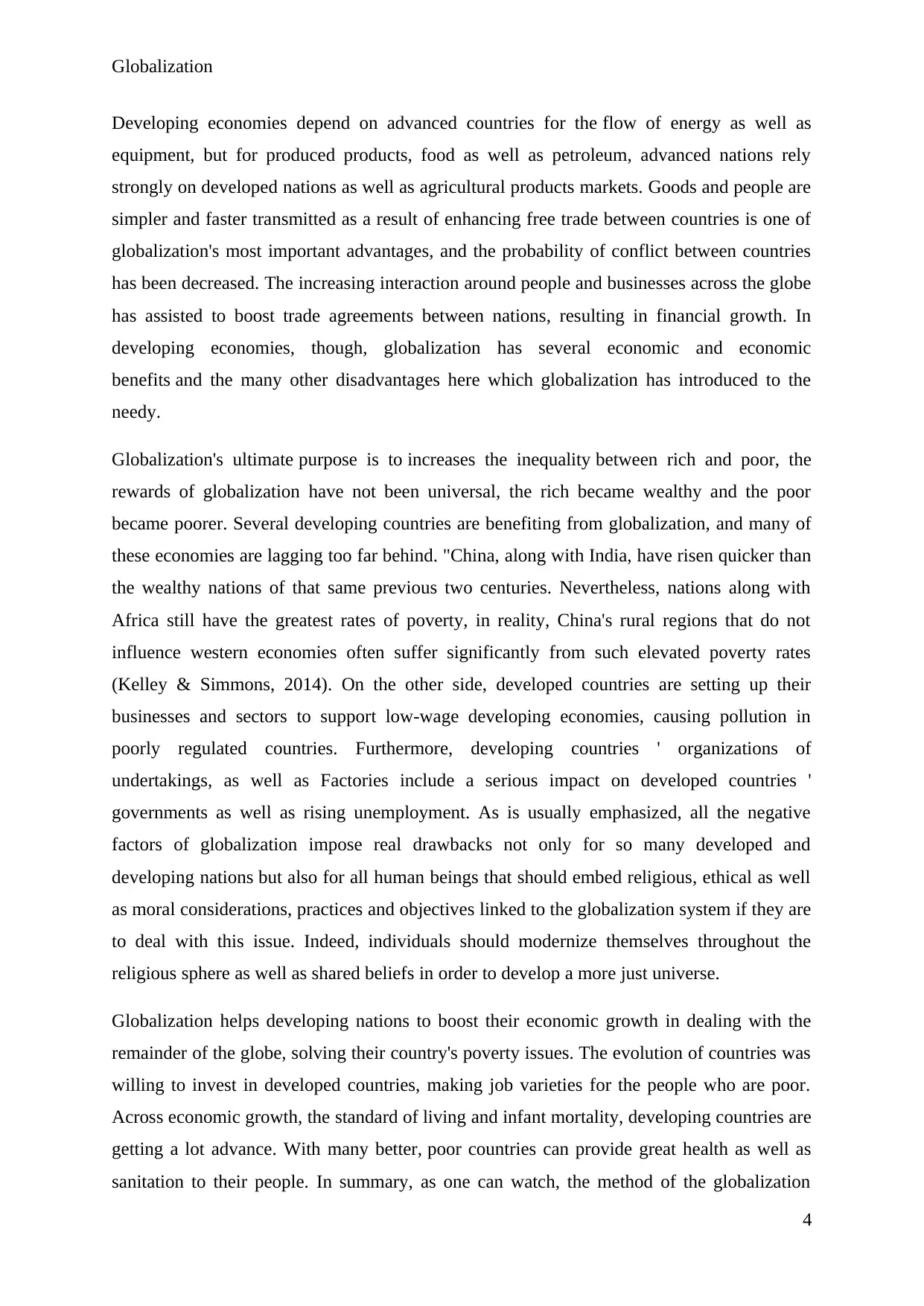
Globalization
Developing economies depend on advanced countries for the flow of energy as well as
equipment, but for produced products, food as well as petroleum, advanced nations rely
strongly on developed nations as well as agricultural products markets. Goods and people are
simpler and faster transmitted as a result of enhancing free trade between countries is one of
globalization's most important advantages, and the probability of conflict between countries
has been decreased. The increasing interaction around people and businesses across the globe
has assisted to boost trade agreements between nations, resulting in financial growth. In
developing economies, though, globalization has several economic and economic
benefits and the many other disadvantages here which globalization has introduced to the
needy.
Globalization's ultimate purpose is to increases the inequality between rich and poor, the
rewards of globalization have not been universal, the rich became wealthy and the poor
became poorer. Several developing countries are benefiting from globalization, and many of
these economies are lagging too far behind. "China, along with India, have risen quicker than
the wealthy nations of that same previous two centuries. Nevertheless, nations along with
Africa still have the greatest rates of poverty, in reality, China's rural regions that do not
influence western economies often suffer significantly from such elevated poverty rates
(Kelley & Simmons, 2014). On the other side, developed countries are setting up their
businesses and sectors to support low-wage developing economies, causing pollution in
poorly regulated countries. Furthermore, developing countries ' organizations of
undertakings, as well as Factories include a serious impact on developed countries '
governments as well as rising unemployment. As is usually emphasized, all the negative
factors of globalization impose real drawbacks not only for so many developed and
developing nations but also for all human beings that should embed religious, ethical as well
as moral considerations, practices and objectives linked to the globalization system if they are
to deal with this issue. Indeed, individuals should modernize themselves throughout the
religious sphere as well as shared beliefs in order to develop a more just universe.
Globalization helps developing nations to boost their economic growth in dealing with the
remainder of the globe, solving their country's poverty issues. The evolution of countries was
willing to invest in developed countries, making job varieties for the people who are poor.
Across economic growth, the standard of living and infant mortality, developing countries are
getting a lot advance. With many better, poor countries can provide great health as well as
sanitation to their people. In summary, as one can watch, the method of the globalization
4
Developing economies depend on advanced countries for the flow of energy as well as
equipment, but for produced products, food as well as petroleum, advanced nations rely
strongly on developed nations as well as agricultural products markets. Goods and people are
simpler and faster transmitted as a result of enhancing free trade between countries is one of
globalization's most important advantages, and the probability of conflict between countries
has been decreased. The increasing interaction around people and businesses across the globe
has assisted to boost trade agreements between nations, resulting in financial growth. In
developing economies, though, globalization has several economic and economic
benefits and the many other disadvantages here which globalization has introduced to the
needy.
Globalization's ultimate purpose is to increases the inequality between rich and poor, the
rewards of globalization have not been universal, the rich became wealthy and the poor
became poorer. Several developing countries are benefiting from globalization, and many of
these economies are lagging too far behind. "China, along with India, have risen quicker than
the wealthy nations of that same previous two centuries. Nevertheless, nations along with
Africa still have the greatest rates of poverty, in reality, China's rural regions that do not
influence western economies often suffer significantly from such elevated poverty rates
(Kelley & Simmons, 2014). On the other side, developed countries are setting up their
businesses and sectors to support low-wage developing economies, causing pollution in
poorly regulated countries. Furthermore, developing countries ' organizations of
undertakings, as well as Factories include a serious impact on developed countries '
governments as well as rising unemployment. As is usually emphasized, all the negative
factors of globalization impose real drawbacks not only for so many developed and
developing nations but also for all human beings that should embed religious, ethical as well
as moral considerations, practices and objectives linked to the globalization system if they are
to deal with this issue. Indeed, individuals should modernize themselves throughout the
religious sphere as well as shared beliefs in order to develop a more just universe.
Globalization helps developing nations to boost their economic growth in dealing with the
remainder of the globe, solving their country's poverty issues. The evolution of countries was
willing to invest in developed countries, making job varieties for the people who are poor.
Across economic growth, the standard of living and infant mortality, developing countries are
getting a lot advance. With many better, poor countries can provide great health as well as
sanitation to their people. In summary, as one can watch, the method of the globalization
4
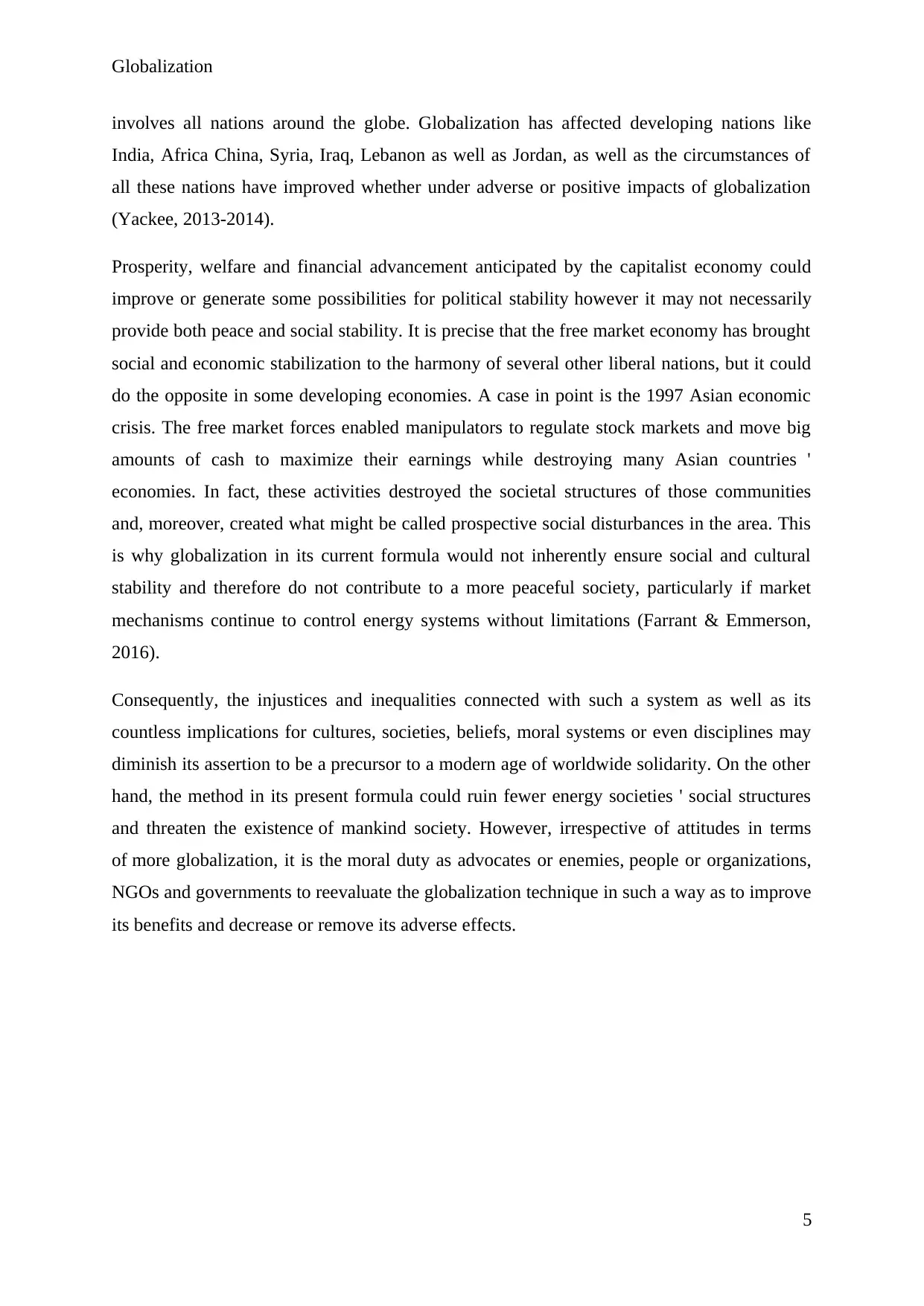
Globalization
involves all nations around the globe. Globalization has affected developing nations like
India, Africa China, Syria, Iraq, Lebanon as well as Jordan, as well as the circumstances of
all these nations have improved whether under adverse or positive impacts of globalization
(Yackee, 2013-2014).
Prosperity, welfare and financial advancement anticipated by the capitalist economy could
improve or generate some possibilities for political stability however it may not necessarily
provide both peace and social stability. It is precise that the free market economy has brought
social and economic stabilization to the harmony of several other liberal nations, but it could
do the opposite in some developing economies. A case in point is the 1997 Asian economic
crisis. The free market forces enabled manipulators to regulate stock markets and move big
amounts of cash to maximize their earnings while destroying many Asian countries '
economies. In fact, these activities destroyed the societal structures of those communities
and, moreover, created what might be called prospective social disturbances in the area. This
is why globalization in its current formula would not inherently ensure social and cultural
stability and therefore do not contribute to a more peaceful society, particularly if market
mechanisms continue to control energy systems without limitations (Farrant & Emmerson,
2016).
Consequently, the injustices and inequalities connected with such a system as well as its
countless implications for cultures, societies, beliefs, moral systems or even disciplines may
diminish its assertion to be a precursor to a modern age of worldwide solidarity. On the other
hand, the method in its present formula could ruin fewer energy societies ' social structures
and threaten the existence of mankind society. However, irrespective of attitudes in terms
of more globalization, it is the moral duty as advocates or enemies, people or organizations,
NGOs and governments to reevaluate the globalization technique in such a way as to improve
its benefits and decrease or remove its adverse effects.
5
involves all nations around the globe. Globalization has affected developing nations like
India, Africa China, Syria, Iraq, Lebanon as well as Jordan, as well as the circumstances of
all these nations have improved whether under adverse or positive impacts of globalization
(Yackee, 2013-2014).
Prosperity, welfare and financial advancement anticipated by the capitalist economy could
improve or generate some possibilities for political stability however it may not necessarily
provide both peace and social stability. It is precise that the free market economy has brought
social and economic stabilization to the harmony of several other liberal nations, but it could
do the opposite in some developing economies. A case in point is the 1997 Asian economic
crisis. The free market forces enabled manipulators to regulate stock markets and move big
amounts of cash to maximize their earnings while destroying many Asian countries '
economies. In fact, these activities destroyed the societal structures of those communities
and, moreover, created what might be called prospective social disturbances in the area. This
is why globalization in its current formula would not inherently ensure social and cultural
stability and therefore do not contribute to a more peaceful society, particularly if market
mechanisms continue to control energy systems without limitations (Farrant & Emmerson,
2016).
Consequently, the injustices and inequalities connected with such a system as well as its
countless implications for cultures, societies, beliefs, moral systems or even disciplines may
diminish its assertion to be a precursor to a modern age of worldwide solidarity. On the other
hand, the method in its present formula could ruin fewer energy societies ' social structures
and threaten the existence of mankind society. However, irrespective of attitudes in terms
of more globalization, it is the moral duty as advocates or enemies, people or organizations,
NGOs and governments to reevaluate the globalization technique in such a way as to improve
its benefits and decrease or remove its adverse effects.
5
⊘ This is a preview!⊘
Do you want full access?
Subscribe today to unlock all pages.

Trusted by 1+ million students worldwide
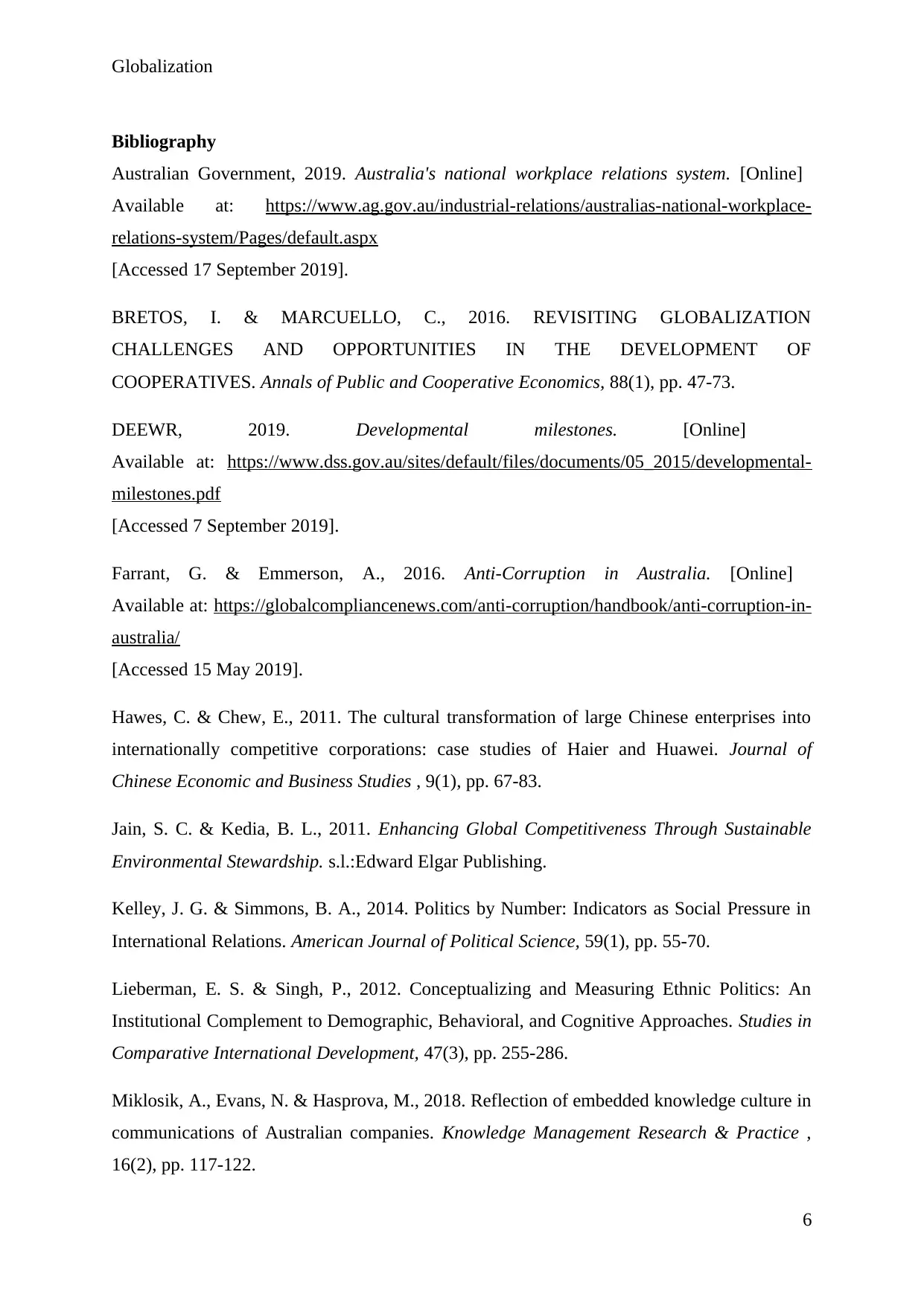
Globalization
Bibliography
Australian Government, 2019. Australia's national workplace relations system. [Online]
Available at: https://www.ag.gov.au/industrial-relations/australias-national-workplace-
relations-system/Pages/default.aspx
[Accessed 17 September 2019].
BRETOS, I. & MARCUELLO, C., 2016. REVISITING GLOBALIZATION
CHALLENGES AND OPPORTUNITIES IN THE DEVELOPMENT OF
COOPERATIVES. Annals of Public and Cooperative Economics, 88(1), pp. 47-73.
DEEWR, 2019. Developmental milestones. [Online]
Available at: https://www.dss.gov.au/sites/default/files/documents/05_2015/developmental-
milestones.pdf
[Accessed 7 September 2019].
Farrant, G. & Emmerson, A., 2016. Anti-Corruption in Australia. [Online]
Available at: https://globalcompliancenews.com/anti-corruption/handbook/anti-corruption-in-
australia/
[Accessed 15 May 2019].
Hawes, C. & Chew, E., 2011. The cultural transformation of large Chinese enterprises into
internationally competitive corporations: case studies of Haier and Huawei. Journal of
Chinese Economic and Business Studies , 9(1), pp. 67-83.
Jain, S. C. & Kedia, B. L., 2011. Enhancing Global Competitiveness Through Sustainable
Environmental Stewardship. s.l.:Edward Elgar Publishing.
Kelley, J. G. & Simmons, B. A., 2014. Politics by Number: Indicators as Social Pressure in
International Relations. American Journal of Political Science, 59(1), pp. 55-70.
Lieberman, E. S. & Singh, P., 2012. Conceptualizing and Measuring Ethnic Politics: An
Institutional Complement to Demographic, Behavioral, and Cognitive Approaches. Studies in
Comparative International Development, 47(3), pp. 255-286.
Miklosik, A., Evans, N. & Hasprova, M., 2018. Reflection of embedded knowledge culture in
communications of Australian companies. Knowledge Management Research & Practice ,
16(2), pp. 117-122.
6
Bibliography
Australian Government, 2019. Australia's national workplace relations system. [Online]
Available at: https://www.ag.gov.au/industrial-relations/australias-national-workplace-
relations-system/Pages/default.aspx
[Accessed 17 September 2019].
BRETOS, I. & MARCUELLO, C., 2016. REVISITING GLOBALIZATION
CHALLENGES AND OPPORTUNITIES IN THE DEVELOPMENT OF
COOPERATIVES. Annals of Public and Cooperative Economics, 88(1), pp. 47-73.
DEEWR, 2019. Developmental milestones. [Online]
Available at: https://www.dss.gov.au/sites/default/files/documents/05_2015/developmental-
milestones.pdf
[Accessed 7 September 2019].
Farrant, G. & Emmerson, A., 2016. Anti-Corruption in Australia. [Online]
Available at: https://globalcompliancenews.com/anti-corruption/handbook/anti-corruption-in-
australia/
[Accessed 15 May 2019].
Hawes, C. & Chew, E., 2011. The cultural transformation of large Chinese enterprises into
internationally competitive corporations: case studies of Haier and Huawei. Journal of
Chinese Economic and Business Studies , 9(1), pp. 67-83.
Jain, S. C. & Kedia, B. L., 2011. Enhancing Global Competitiveness Through Sustainable
Environmental Stewardship. s.l.:Edward Elgar Publishing.
Kelley, J. G. & Simmons, B. A., 2014. Politics by Number: Indicators as Social Pressure in
International Relations. American Journal of Political Science, 59(1), pp. 55-70.
Lieberman, E. S. & Singh, P., 2012. Conceptualizing and Measuring Ethnic Politics: An
Institutional Complement to Demographic, Behavioral, and Cognitive Approaches. Studies in
Comparative International Development, 47(3), pp. 255-286.
Miklosik, A., Evans, N. & Hasprova, M., 2018. Reflection of embedded knowledge culture in
communications of Australian companies. Knowledge Management Research & Practice ,
16(2), pp. 117-122.
6
Paraphrase This Document
Need a fresh take? Get an instant paraphrase of this document with our AI Paraphraser
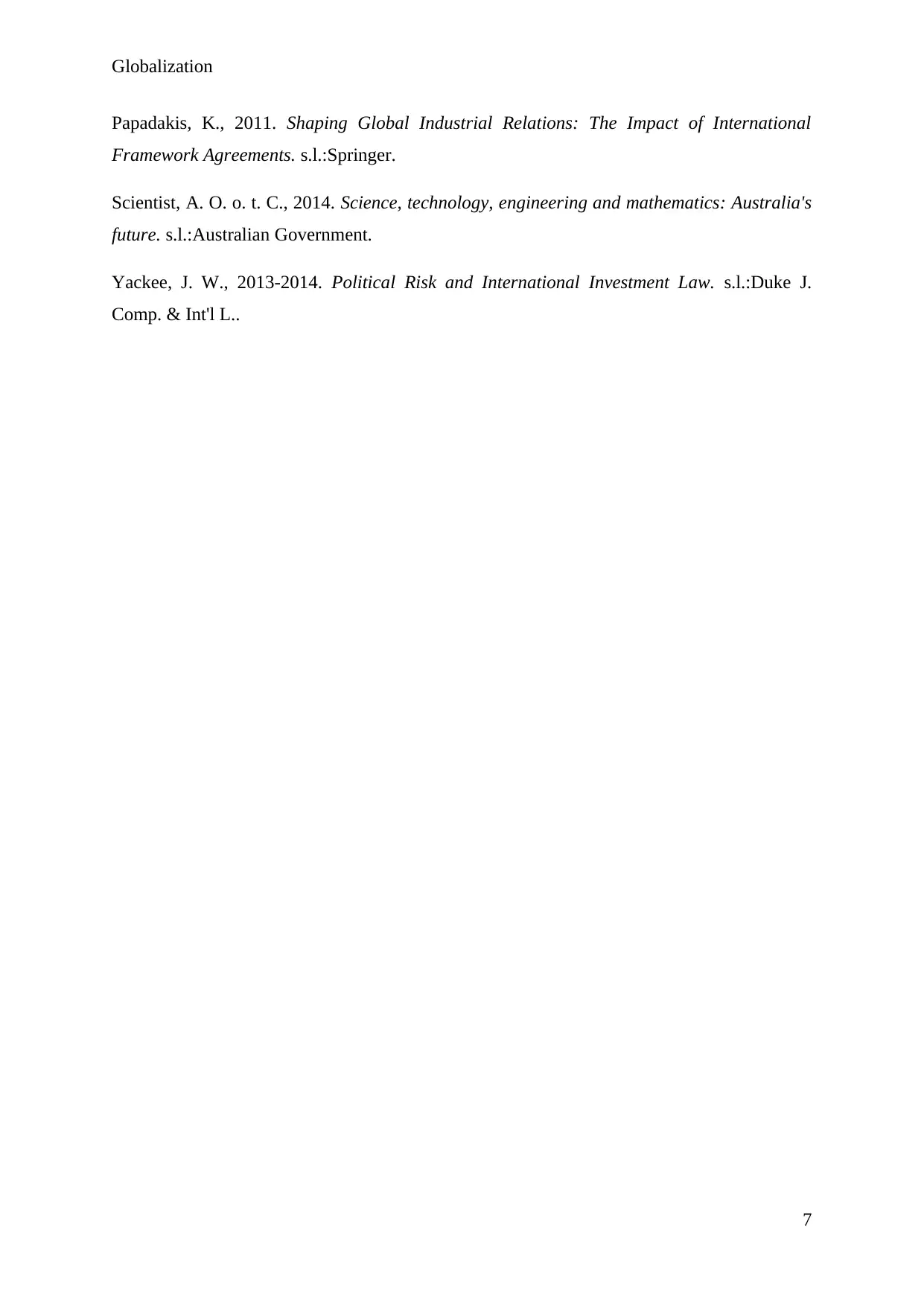
Globalization
Papadakis, K., 2011. Shaping Global Industrial Relations: The Impact of International
Framework Agreements. s.l.:Springer.
Scientist, A. O. o. t. C., 2014. Science, technology, engineering and mathematics: Australia's
future. s.l.:Australian Government.
Yackee, J. W., 2013-2014. Political Risk and International Investment Law. s.l.:Duke J.
Comp. & Int'l L..
7
Papadakis, K., 2011. Shaping Global Industrial Relations: The Impact of International
Framework Agreements. s.l.:Springer.
Scientist, A. O. o. t. C., 2014. Science, technology, engineering and mathematics: Australia's
future. s.l.:Australian Government.
Yackee, J. W., 2013-2014. Political Risk and International Investment Law. s.l.:Duke J.
Comp. & Int'l L..
7
1 out of 8
Related Documents
Your All-in-One AI-Powered Toolkit for Academic Success.
+13062052269
info@desklib.com
Available 24*7 on WhatsApp / Email
![[object Object]](/_next/static/media/star-bottom.7253800d.svg)
Unlock your academic potential
Copyright © 2020–2026 A2Z Services. All Rights Reserved. Developed and managed by ZUCOL.




